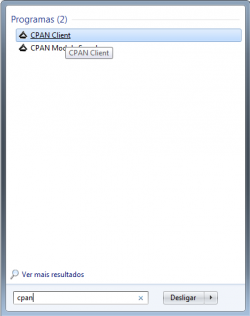installing Modules: Difference between revisions
Created page with '== What are modules == The '''modules''' are usually complements open source and free, which serve to add commands and functionality to Perl. They are usually released on CPAN - …' |
|||
| (4 intermediate revisions by 4 users not shown) | |||
| Line 1: | Line 1: | ||
''Completely out of scope of openkore documentation. http://www.cpan.org/modules/INSTALL.html'' | |||
= What are modules = | |||
In this context, modules are Perl libraries. Some openkore features or plugins require modules from CPAN which are not bundled with openkore. | |||
= Installation = | |||
== Linux and OS X == | |||
=== Your system repositories === | |||
The following naming scheme is used in Debian: module <code>File::Slurp</code> is in package <code>libfile-slurp-perl</code>. | |||
=== CPAN === | |||
Run <code>cpan File::Slurp</code> to download and install the specified module. | |||
== Windows == | |||
=== Active Perl === | === Active Perl === | ||
Active Perl offers a program to download and install modules with a user friendly interface, called Perl Packet Manager (PPM), and a different mirror. The service is paid. | Active Perl offers a program to download and install modules with a user friendly interface, called Perl Packet Manager (PPM), and a different mirror. The service is paid. | ||
| Line 15: | Line 28: | ||
How to install modules using the Strawberry: | How to install modules using the Strawberry: | ||
# After installing Strawberry, open the CPAN Client (In Windows Vista and later, just search on the start menu by CPAN) | # After installing Strawberry, open the CPAN Client (In Windows Vista and later, just search on the start menu by CPAN)<br>[[File:Cpan1.png|250px]] | ||
[[ | |||
# In the console, use the following command to install modules: | # In the console, use the following command to install modules: | ||
:install <module name> | :install <module name> | ||
'''''Note:''''' If the module has '''-''' in its name, substitute to '''::'''. For example: '''Protocol-WebSocket''' should be typed '''Protocol::WebSocket''' | '''''Note:''''' If the module has '''-''' in its name, substitute to '''::'''. For example: '''Protocol-WebSocket''' should be typed '''Protocol::WebSocket''' | ||
Latest revision as of 21:35, 27 April 2021
Completely out of scope of openkore documentation. http://www.cpan.org/modules/INSTALL.html
What are modules
In this context, modules are Perl libraries. Some openkore features or plugins require modules from CPAN which are not bundled with openkore.
Installation
Linux and OS X
Your system repositories
The following naming scheme is used in Debian: module File::Slurp is in package libfile-slurp-perl.
CPAN
Run cpan File::Slurp to download and install the specified module.
Windows
Active Perl
Active Perl offers a program to download and install modules with a user friendly interface, called Perl Packet Manager (PPM), and a different mirror. The service is paid.
How to install modules using the PPM:
- Open Perl Package Manager (Start -> Run -> 'ppm')
- In the graphical interface that appears, search for the modules using the text field above and select the modules you want to install or upgrade
- After mark modules, click the green arrow to start the download and installation
Strawberry
The Strawberry offers a console program to download and install modules directly from the official repository, CPAN. The service is free.
How to install modules using the Strawberry:
- After installing Strawberry, open the CPAN Client (In Windows Vista and later, just search on the start menu by CPAN)

- In the console, use the following command to install modules:
- install <module name>
Note: If the module has - in its name, substitute to ::. For example: Protocol-WebSocket should be typed Protocol::WebSocket